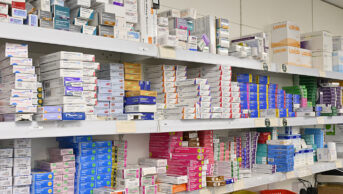
Thomas Nugent / Wikimedia Commons
The pharmaceutical industry’s systems for self-regulation of drug advertising and marketing are weak, with some resulting in frequent and serious violations, according to a study published in PLoS Medicine
[1]
on 17 February 2015.
Researchers analysed the industry’s codes of conduct governing the marketing of medicines in Sweden and the UK. They looked at the number of complaints, complainants and decisions during 2004-2012. The picture painted by the study holds lessons for the rest of the EU, say its authors, since these two countries are frequently cited as examples of effective industry self-regulation.
The study analysed 536 and 597 cases ruled in breach of the industry’s codes of conduct in Sweden and the UK, respectively. It found that companies were charged, on average, €447,000 and €765,000, respectively, which equate to 0.014% and 0.0051% of annual revenues from the sales of the fined companies in the two countries (in contrast, US fines amount to 0.8% of revenues).
Around 19% of cases in Sweden and 17% of cases in the UK were deemed to be “particularly serious”. In both countries, most of the violations concerned misleading promotions.
A total of 46 companies were ruled in breach of the code for a serious offence at least once in both countries combined; seven companies were in serious violation more than ten times each.
“The prevalence and severity of breaches testifies to a discrepancy between the ethical standard codified in industry codes of conduct and the actual conduct of the industry,” the researchers conclude. The solutions they propose entail strengthening the role of regulators, such as tighter active monitoring and pre-vetting of promotional and advertising activities, encouraging whistleblowing, imposing stronger penalties on companies and greater publicity for violations.
The drug regulator, the Medicines and Healthcare products Regulatory Agency (MHRA), which oversees drug advertising in the UK, welcomed the study, noting that it was only possible because Sweden and the UK have well-developed and transparent self-regulatory systems.
“We already vet advertising for around 50 products each year, chosen on a risk basis. The evidence we have is that this has improved compliance and reduced the number of serious violations. But we are not complacent and we continually look at ways to enhance the robustness of regulation in the UK,” says an MHRA spokesperson.
The study notes that the MHRA is preparing to relax its vetting efforts, but will continue to look at “perhaps a small number of key pieces… in a very light touch way”. However, the MHRA points out that this would only apply to companies that have a “good track record in complying with the law”. The MHRA adds: “We have no plans to reduce vetting more widely and consider that this targeting represents appropriate use of our resources.”
The UK’s industry self-regulatory body, the Prescription Medicines Code of Practice Authority (PMCPA), is also criticised in the study. “Despite the fact that active monitoring is supposedly a major function of the PMCPA under the code, and despite a memorandum involving the Association of the British Pharmaceutical Industry (ABPI), PMCPA, and MHRA that since 2005 tasks the PMCPA with routine scrutiny of promotional material, there is little prima facie evidence that the authority fulfils its duties in this respect to any significant extent,” the study says.
In response, the ABPI argues that the study is “simply proof” that the system of self-regulation is working and effective. “There will always be critics of self-regulation and it is worth noting that the majority of data that inform this study are taken from the material placed in the public domain by the PMCPA as part of the regulatory process.”
The wider industry association, the European Federation of Pharmaceutical Industries and Associations (EFPIA), sees the prevalence of code violations as “testimony to the efficiency of these self-regulatory systems that misconduct is indeed identified”.
EFPIA highlights the researchers’ admission that the study only looks at the number of violations and not the total volume of marketing material produced by companies that is compliant with the codes of conduct. By contrast, the researchers argue that their work underestimates the problem of unethical drug advertising: “Violations that go undetected or unpunished by self-regulatory bodies are the main limitation of this study, since they are likely to lead to an underestimate of industry misconduct.”
An international group campaigning against misleading health information, Healthy Skepticism, welcomes the study’s recommendations, but describes them as only “small steps in the right direction”. It has its own proposals for reform, which include improving the regulation of drug promotion, improving healthcare decision-making and redesigning the incentive systems for all those involved in drug use.
Ultimately, however, drug promotion violations will not stop until penalties hit the bottom line, says Peter Mansfield, the group’s founder. “Pharmaceutical companies are likely to continue to over-promote their drugs as long as it is profitable to do so,” he says. “Consequently, misleading promotion will continue until it is made unprofitable, either by increasing the severity and frequency of punishments and/or by decreasing the incentives.”
EFPIA says fines are just one of a range of sanctions deployed by national industry associations. “EFPIA requires the publication of any final decision and encourages the publication of the summary decisions in English. This transparency continues to drive best practice,” it says. However, the study notes that Sweden has not published any violation rulings, highlighting the differences between different self-regulation scenarios across the EU.
The Swedish counterpart the Medical Products Agency was not available at the time of going to press to comment on the study.
References
[1] Zetterqvist AV, Merlo J & Mulinari S. Complaints, complainants, and rulings regarding drug promotion in the United Kingdom and Sweden 2004–2012: A quantitative and qualitative study of pharmaceutical industry self-regulation. PLoS Medicine 12(2): e1001785. doi:10.1371/journal.pmed.1001785.


